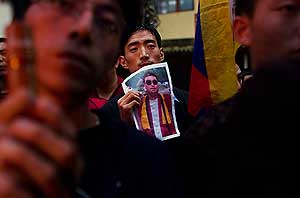Search Buddhist Channel
China must face home truths on Tibet
by John Lee, The Australian, February 14, 2012
Sydney, Australia -- THE self-immolation of an 18-year-old Buddhist nun on Saturday was the 22nd known instance of the act in the past year in the Chinese-governed Tibet autonomous region.
 Last week, Beijing pledged to "resolutely crack down" on any ethnic Tibetan protesters while the Chinese Tibetan government warned that any local official failing to perform their duty of maintaining order "will be fired on the spot and subject to disciplinary penalties."
Last week, Beijing pledged to "resolutely crack down" on any ethnic Tibetan protesters while the Chinese Tibetan government warned that any local official failing to perform their duty of maintaining order "will be fired on the spot and subject to disciplinary penalties."
Despite the fact that China's hold over Tibet is officially recognised by all major countries, Beijing remains paranoid that external forces seek to split the western regions of Tibet and Xinjiang, which together comprise one third of modern China by landmass, from the rest of the country.
But problems in Tibet will not be resolved by condemning all those concerned with possible human rights abuses as "splittists", as Beijing does routinely. Nor will throwing money at a region appease an indigenous people and culture who believe they are being suppressed.
Beijing's sense of domestic vulnerability is genuine. Figures last year indicated Beijing allocated $US105 billion ($98bn) to fund the People's Armed Police, more than the official budget for the People's Liberation Army. Answerable only to the Chinese Communist Party, a disproportionate and growing share of PAP resources is deployed in and around Tibet and Xinjiang.
According to official sources, Beijing spent more than $US50bn on more than 400 major development projects in Tibet alone over several decades. The government complains that such largesse is rewarded with dissent, ignoring the fact that ethnic Han Chinese encouraged en masse to move into these areas have become the beneficiaries of development in these areas. Even though the living standards of ethnic Tibetans have undoubtedly been raised, discrimination in favour of Han Chinese is still widespread.
Few ethnic Tibetans can forgive the reported destruction of an estimated 6000 Buddhist temples and shrines in Tibet since the late 1950s. Indeed, forcibly "regulating" traditional Tibetan culture and religion under the watchful and suspicious auspices of state-sanctioned agencies is unlikely to inure today's Tibetans to the realities of Beijing-centred rule. China's paranoia over any sign of unrest in Tibet also betrays its own forced confidence that the CCP's official version of history can sustainably hold.
CCP history insists modern-day China, with its 33 provinces, municipalities and autonomous regions (34 if you include Taiwan), is China's natural historical condition, and has been so for thousands of years. Yet this version conveniently overlooks the fact that the preferred geography of the People's Republic of China was decided only after Mao Zedong's communists came to power in 1949.
The new political arrangement had several precedents to choose from. Perhaps predictably, Mao chose the grander option, preferring to recreate the perceived glory of a greater China, which the Qing Dynasty ruled over before it fell in 1911. In doing so, the newly created PRC laid claim to lands inhabited by Monguls, Central Asians and Tibetans.
The 1950 invasion of Tibet was the first salvo in regenerating a "Greater China" that the Qing Dynasty had bloodily cobbled together in the 18th and 19th centuries. Once incorporated, the reality that Tibet fell back into autonomy from 1911-1950 was conveniently ignored in official histories.
Conquering and re-conquering territories and incorporating these into the official maps of those who triumph is hardly unique to China. But its misuse of history is emerging at a time when its every action is heavily scrutinised abroad, and suppressing minorities within one's country is no longer accepted as evidence of a responsible great power.
Unlike past centuries, the covenant between sovereigns and citizens puts obligations on both to play their part in maintaining a just order. For China, its modern habit of tolerance for different cultures within its territories is immature in an authoritarian system tending to see domestic and external conspiracies against its rise in the shadows.
Denying the historical truth that China is a conquering power leads Beijing to the counter-productive delusion that it has no need to arrive at a mutually acceptable concord with the Tibetan people under its rule. Revisiting official histories might help inform frustrated Beijing officials why many of the indigenous people of Tibet feel little pride in the modern rise and achievements of the PRC.
Putting more military and economic resources into imposing order will not do the trick. Revisiting false histories to better understand the discontent of a conquered people and suppressed culture is the better way ahead for Chinese rule in Tibet, and in its attempts to convince the region and the world that its rise should not be feared.
----------
Dr John Lee is the Michael Hintze Fellow for Energy Security and an adjunct associate professor at the Centre for International Security Studies, Sydney University, and a non-resident senior scholar at the Hudson Institute in Washington DC
Please support to keep NORBU going:
For Malaysians and Singaporeans, please make your donation to the following account:
Account Name: Bodhi Vision
Account No:. 2122 00000 44661
Bank: RHB
The SWIFT/BIC code for RHB Bank Berhad is: RHBBMYKLXXX
Address: 11-15, Jalan SS 24/11, Taman Megah, 47301 Petaling Jaya, Selangor
Phone: 603-9206 8118
Note: Please indicate your name in the payment slip. Thank you.
We express our deep gratitude for the support and generosity.
If you have any enquiries, please write to: editor@buddhistchannel.tv

